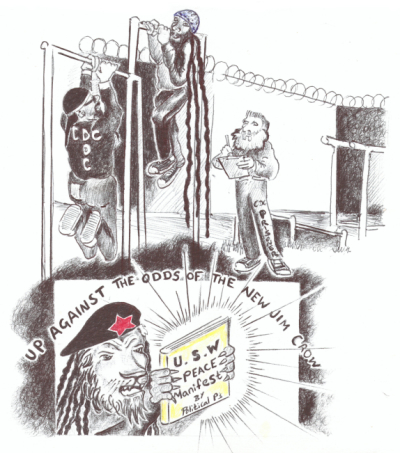
Gleaning from Bourgeois Psychology for Our Own Strength
This issue of Under Lock & Key is devoted to exploring tactics in organizing behind bars. We often hear how hard it is to get people interested in politics, how so many are just doing their time, or worse, getting high, collaborating with the COs, or promoting division among prisoners. But we also hear from comrades about organizing successes. We can all learn from our own failures and successes and also from other people’s failures and successes.
This scientific process of learning from practice, and using those lessons to improve our practice, is key to moving our organizing work forward. Marxism is based in this science that we call dialectics. Often people talk about it in the context of deep political line. But political line is only useful if it can direct a successful political practice. And so, as we spread revolutionary ideas and organize against the criminal injustice system, we need to pay attention to what works and what doesn’t, both for us and for others. And then apply these lessons to improving our own work. Without dialectics the revolutionary movement will stagnate; with dialectics we will continue to learn and grow.
In a few articles in this issue we highlight the work of a psychologist, Angela Duckworth, who has conducted and compiled studies of how to engage and inspire people in work and how to build expertise. Although ey writes about this subject from the perspective of mastering bourgeois work or hobbies, we find some of the techniques and information presented to be directly applicable to revolutionary organizing. We learn from scientific studies like those presented by Duckworth, along with our own practice, to grow and improve our work.
Duckworth is an interesting psychologist because eir work focuses on measuring what ey calls “personal qualities” or traits, but eir work also demonstrates that these traits of a persyn can and do change over time. And individuals and society can have an impact on developing desired qualities. We agree with Duckworth on this assessment of the ability of people to change and grow through both their own work and external forces. In eir more recent works, Duckworth clearly agrees with us that these “traits” are more a product of education and training than inherent in one’s persynality. Duckworth’s writing is instructive as we look for ways to improve our own dedication and effectiveness, and ways to better inspire others.
MIM(Prisons), like MIM before it, has long maintained that the field of psychology under imperialism is generally used to help people adjust to their oppression and adapt to the horrible culture of imperialist patriarchy. It is a counter-revolutionary weapon when used in this way. Further, bourgeois psychology often attributes behaviors to inherent traits instead of material circumstances and conditions, suggesting that humyns can’t change. We don’t have the ability to run truly scientific experiments on humyn nature, but we have a lot of evidence from revolutionary societies like the Soviet Union under Lenin and Stalin, and Communist China under Mao to suggest that humyns have a tremendous capacity to learn and grow and overcome selfish individualism.
Instead of seeing the selfishness and individualism in capitalist culture as reasons that humynity will “always” have oppression and suffering, we see it as evidence of the importance of a Cultural Revolution under socialism. This concept was executed on a mass scale in China under Mao. The Cultural Revolution recognizes the need for the people to vigilently fight against reactionary culture and capitalist ideas, even after the proletariat controls the government, because capitalist culture and individualism will not disappear overnight.
Of course in the end individualism and self-interest won out in those countries when capitalism was restored. But this doesn’t negate the very real changes that so many people made in revolutionary societies. We look to these examples as hopeful evidence, while studying them for improvements needed for better success in the future.
There are people in the fields of psychiatry (medical doctors) and psychology (not medical doctors) who have taken their study of humyns in a revolutionary direction, contributing to the anti-imperialist movement. Frantz Fanon is an excellent example of a revolutionary psychiatrist. Among eir revolutionary work, Fanon’s scientific studies contributed greatly to our understanding of the effects of colonial subjugation on the oppressed, and a broader study of the lumpen. Duckworth is not revolutionary, or anti-capitalist, or anti-Amerikan, and ey is still mired in some of the pitfalls of the field of capitalist psychology. But eir research presents some useful concepts and techniques for revolutionary organizing work. In this spirit of scientific learning we touch on Duckworth’s work in this issue of ULK.








